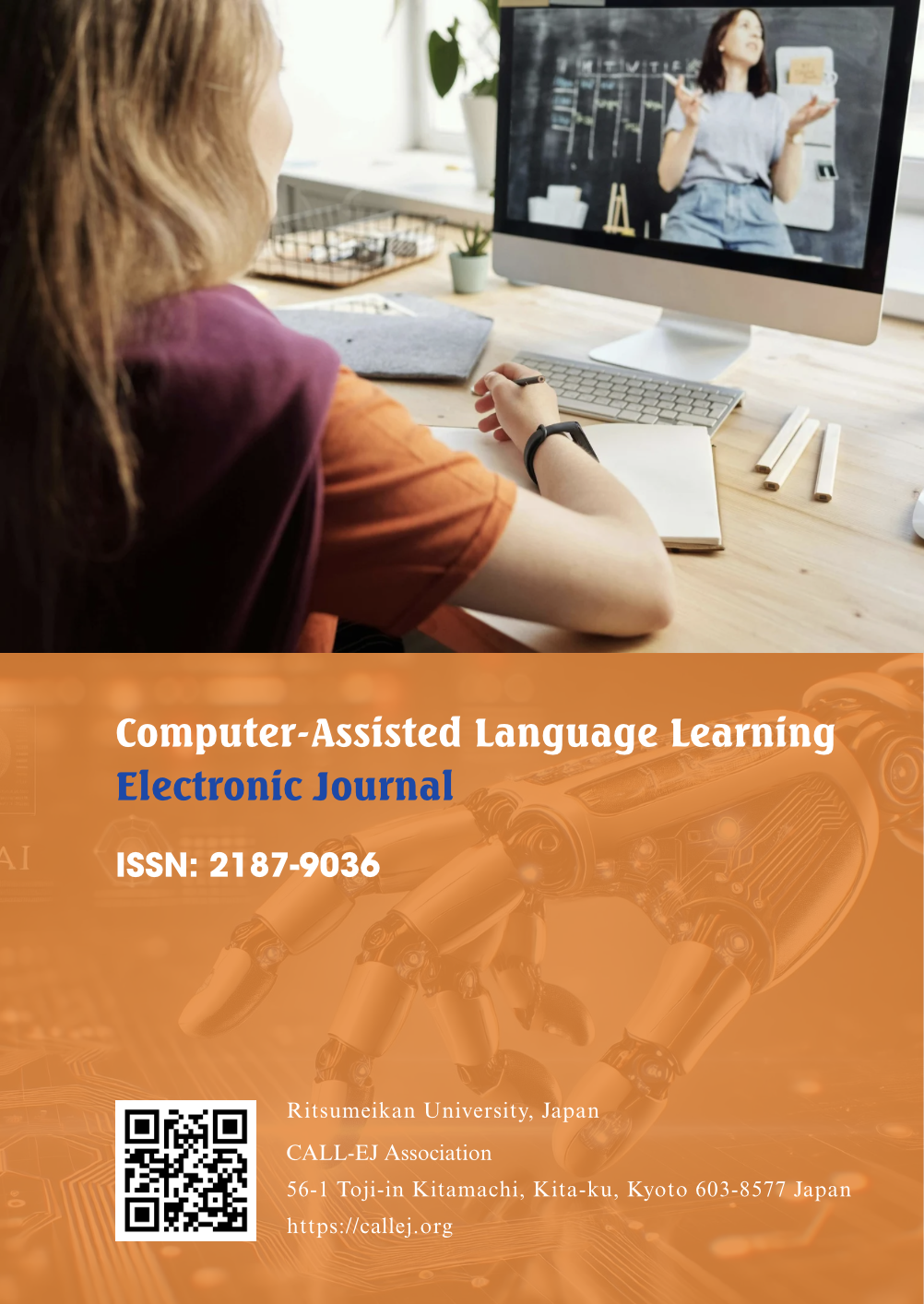Further Student Perceptions of Online Intercultural Collaborations in the IVEProject
DOI:
https://doi.org/10.54855/Keywords:
online collaboration, intercultural collaboration, sharing culture, IVEProject, EFLAbstract
This qualitative study explored student perceptions of participating in online intercultural collaborations to confirm existing research in this field. English-major students at a Japanese private university participated in the IVEProject online intercultural collaboration project in their third year of study. A total of 59 participants in two cohorts recorded their impressions of the online collaborations after a semester-long project. This paper reports on the qualitative findings of participants’ spoken reflections of the IVEProject. This study used grounded theory (Glaser & Strauss, 1967) to code and analyze the participants’ responses to identify overall perceptions of the effectiveness of online collaborations as well as what the students shared and learned about other cultures. The data revealed positive attitudes toward online intercultural collaborations and perceived improvements in participants’ language skills—they learned new slang and other vocabulary—as well as a greater understanding of cultural similarities and differences among the participants in the IVEProject, specifically in the areas of food culture, music genres, festivals, and holiday practices. The students’ perspectives generally demonstrated that online intercultural collaborations such as the IVEProject provide an excellent opportunity for language learners to expand their linguistic and cultural horizons without traveling abroad.
References
Bissett, H. (2021). A study of Kanazawa Seiryo University Women’s Junior College students’ perceptions of the IVE project: A preliminary analysis. In Memoirs of Kanazawa Seiryo University. Kanazawa Seiryo University. http://www.seiryo-u.ac.jp/u/research/gakkai/ronbunlib/j_ronsyu_pdf/no50/05_bissett_50.pdf
Donnery, E. (2022). From demotivation to intercultural communicative competence (ICC): Japanese university learner journeys in the International Virtual Exchange Project (IVEProject). In S. Hilliker (Ed.), Second language teaching and learning through virtual exchange (pp. 35–48). de Gruyter GmbH.
Forsythe, E. (2014). Online intercultural collaborations using wikis: An analysis of students’ comments and factors affecting project success. JALT CALL Journal, 10(3), 255–271. https://doi.org/10.29140/jaltcall.v10n3.179
Forsythe, E. (2024). Student Perceptions of Online Intercultural Collaborations in the IVEProject. In D. Shaffer (Ed.), KOTESOL Proceedings 2024 (pp. 115-124). KOTESOL Publications.
Glaser, B., & Strauss, A. (1967). The discovery of grounded theory: Strategies for qualitative research. Aldine Transaction. http://www.sxf.uevora.pt/wp-content/uploads/2013/03/Glaser_1967.pdf
Hagley, E. (2016). Making virtual exchange/telecollaboration mainstream: Large scale exchanges. In S. Jager, M. Kurek, & B. O’Rourke (Eds.), New directions in telecollaborative research and practice: Selected papers from the second conference on telecollaboration in higher education (pp. 225–230). Research-publishing.net. https://doi.org/10.14705/rpnet.2016.telecollab2016.511
Hagley, E. (2020). Effects of virtual exchange in the EFL classroom on students’ cultural and intercultural sensitivity. Computer-Assisted Language Learning Electronic Journal, 21(3), 74–87. https://old.callej.org/journal/21-3/Hagley2020.pdf
Hagley, E., & Cotter, M. (2019). Virtual exchange supporting language and intercultural development: Students’ perceptions. In F. Meunier, J. Van de Vyver, L. Bradley, & S. Thouësny (Eds.), CALL and complexity: Short papers from EUROCALL 2019 (pp. 163–168). Research-publishing.net. https://doi.org/10.14705/rpnet.2019.38.1003
IVEProject FAQ. (2024, May 13). IVEProject. https://iveproject.org/mod/page/view.php?id=1
Lawrence, G. (2013, July). A pedagogical model to support collaborative online intercultural language learning environments [Conference presentation slides]. WorldCALL 2013, Glasgow, Scotland. https://researchgate.net/publication/281452920_A_Pedagogical_Model_to_Support_Collaborative_Online_Intercultural_Language_Learning_Environments
Matsumoto, Y. (2024). Fostering intercultural competence through virtual exchange in Japanese higher education. In WorldCALL2023: Conference proceedings (pp. 17–25). IAFOR. https://doi.org/10.22492/issn.2759-1182.2023.3
O’Dowd, R. (2016). Learning from the past and looking to the future of online intercultural exchange. In R. O’Dowd & T. Lewis (Eds.), Online intercultural exchange: Policy, pedagogy, practice. Routledge.
OpenAI. (2022). Introducing Whisper. https://openai.com/index/whisper/
Ottoson, K. (2022). Enhancing and expanding intercultural learning through collaborative online international learning. In T. D. Cooper & J. York (Eds.), Remote teaching and beyond (pp. 91–106). JALT CALL SIG. https://doi.org/10.37546/JALTSIG.CALL.PCP2021-01
Remmerswaal, R. (2023). First-year student perceptions of the International Virtual Exchange. SILC Journal, 2, 37–45, https://sojo-u.repo.nii.ac.jp/?action=repository_uri&item_id=1646&file_id=23&file_no=1
Downloads
Published
Issue
Section
License
Copyright (c) 2025 Author and CALL-EJ

This work is licensed under a Creative Commons Attribution 4.0 International License.
Copyright of articles is retained by authors and CALL-EJ. As CALL-EJ is an open-access journal, articles are free to use, with proper attribution, in educational and other non-commercial settings. Sources must be acknowledged appropriately.

